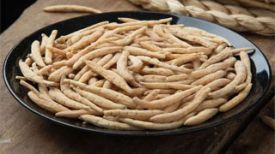Glycyrrhiza uralensis Fisch, also known as Guolao, Sweetgrass, Ural Licorice, and Sweet Roots. Leguminous and licorice perennial herbs with thick roots and rhizomes are a type of nourishing Chinese herbal medicine. A good medicine for the human body, with medicinal parts including roots and rhizomes. The medicinal material has a cylindrical shape with a length of 25-100 centimeters and a diameter of 0.6-3.5 centimeters. The elasticity of the outer skin varies, and the surface is reddish brown or grayish brown. The rhizome is cylindrical, with bud marks on the surface and pulp in the middle of the cross-section. Mild in flavor, sweet and unique in taste. Indications: Clear heat and detoxify, dispel phlegm and cough, and treat abdominal pain. A dry climate with long sunshine and low temperature, preferring shade, dark tides, and humidity. Licorice mostly grows in arid and semi-arid desert grasslands, desert edges, and loess hilly areas. Roots and rhizomes are used for medicinal purposes.
Medicinal value
1. Used for heart qi deficiency, palpitations, pulse stagnation, as well as spleen and stomach qi deficiency, fatigue, and fatigue. The former is often paired with cinnamon twigs, such as cinnamon twig licorice soup and roasted licorice soup. The latter is often used equivalently with Codonopsis pilosula and Atractylodes macrocephala, such as Sijunzi Tang and Lizhong Wan.
2. Used for carbuncle, sore, sore throat, etc. Can be used alone, orally or externally, or in combination. Ulcers and sores, often used together with honeysuckle and forsythia, play the role of clearing heat and detoxifying, like the immortal formula for promoting vitality. Throat swelling and pain, often used together with Platycodon grandiflorus, such as Platycodon grandiflorus soup. If pesticide or food poisoning occurs, it is often accompanied by mung beans or boiled with anti feng shui.
3. Used for wheezing and coughing. It can be used alone or in combination with other medications. Erchen decoction for treating dampness, phlegm, and cough; Ling Gan Wu Wei Jiang Xin Tang for treating cold phlegm, cough and asthma; Sangxing Tang for treating dry phlegm and cough; Platycodon grandiflorus soup is used to treat lung abscess, cough, spit, foul smell, pus and phlegm caused by heat toxicity; Licorice and ginger soup for treating cough, saliva, and saliva. In addition, cough caused by wind heat, cough caused by wind cold, and cough caused by hot phlegm are often used in combination.
4. Used for stomach pain, abdominal pain, and gastrocnemius muscle spasm pain, often used together with peony, it can significantly enhance the therapeutic effect of treating spasm pain, such as peony and licorice soup.
5. Used to harmonize the intensity of certain drugs. This product is used to alleviate the laxative effects of rhubarb and mirabilite, as well as their irritation to the gastrointestinal tract, in the case of seasoning Chengqi Tang. In addition, this product is commonly used in many prescriptions to blend various medications.
6. Licorice has a hormone like effect similar to adrenal cortex. Has an inhibitory effect on excessive gastric acid secretion caused by histamine; And it has anti acid and relieving gastrointestinal smooth muscle spasms.
7. Licorice flavonoids, licorice extracts, and glycyrrhetinic acid all have significant antitussive effects; The expectorant effect is also significant, with the intensity of action being glycyrrhetinic acid>glycyrrhetinic acid flavonoids>licorice extract.
8. Licorice also has anti-inflammatory and anti allergic effects, which can protect the inflamed throat and tracheal mucosa. Licorice extract and glycyrrhetinic acid have detoxifying effects similar to glucuronic acid on certain toxins.
9. Licorice is commonly used to treat symptoms that come with menopause. Because licorice contains glycyrrhizin, a hormone like compound that helps balance hormone levels in women's bodies.
10. The subacids contained in licorice can block the effect of carcinogens on inducing tumor growth
Medicinal toxicity
Long term consumption of high doses of licorice can cause swelling. Research has also found that licorice preparations can impair sexual function. Taking 28 grams of licorice daily can lead to decreased libido and other forms of sexual impotence in men, which can be restored after 4 days of discontinuation. Licorice can also inhibit the conversion of cortisol, leading to elevated blood pressure and hypokalemia. Therefore, for patients with sexual dysfunction, hypertension, and edema, licorice should not be used.
licorice
Release time:2024-05-28 15:16:55
Reading:237
Word Count:4572
Subscribe to email


